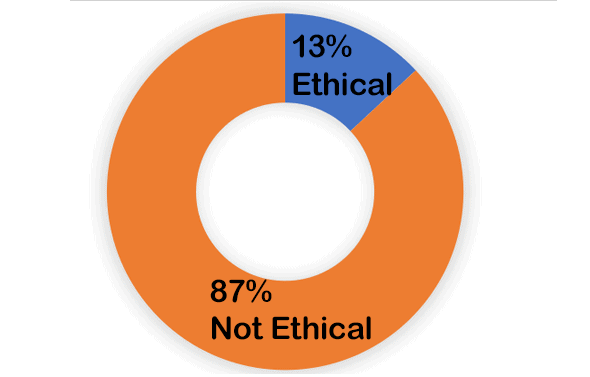This is the August 2021 edition of our monthly series of Ethics case studies titled What Do You Think? This series is comprised of case studies from NSPE archives, involving both real and hypothetical matters submitted by engineers, public officials and members of the public.
Your peers and the NSPE Board of Ethical Review have reviewed the facts of the case as shown below. And, here are the results.
Your opinion has been registered for the August 2021 edition of our monthly series of Ethics case studies titled What Do You Think?
Your vote is recorded as:

Want to know how your peers voted? We’ll send you an email with the poll results on August 24.
Your opinion has been registered for the August 2021 edition of our monthly series of Ethics case studies titled What Do You Think?
Your vote is recorded as:

Want to know how your peers voted? We’ll send you an email with the poll results on August 24.
A Review of the Facts
Engineer Fred is the sole owner of Best Engineering, a private consulting engineering firm located in the city of Midway. The city of Midway engages the services of Best Engineering to provide design review and construction inspection. In accordance with local ordinance governing land development, private developers are required to submit plans to the city for review and approval. The developer must pay the city’s expenses for Best Engineering to review the drawings. Additionally, during construction, the developer must also pay for inspection services, to be provided by Best Engineering on the city’s behalf.
The ordinance specifically states that these inspection services are solely for the purpose of ensuring the construction of infrastructure within the development, which is to be turned over to the city, is constructed in accordance with the city’s design standards. The developer must pay for separate inspection services in order to protect his interests. Best Engineering also provides design and inspection services for private developers within the city. In fact, Fred uses Best Engineering’s position as the city’s engineer as a marketing tool, openly telling prospective clients that they can save 50% on inspection costs by using their firm.
Was it ethical for Fred to serve as city engineer and also provide review and inspection services for private developers within the city?
Here is the result of our survey of your peers:

Applicable NSPE Code References:
Code II.4.d: Engineers in public service as members, advisors, or employees of a governmental or quasi-governmental body or department shall not participate in decisions with respect to services solicited or provided by them or their organizations in private or public engineering practice.
Code III.7.a: Engineers in private practice shall not review the work of another engineer for the same client, except with the knowledge of such engineer, or unless the connection of such engineer with the work has been terminated.
Discussion
The Board has considered cases similar to this type on other occasions. In BER Case 62-7, an engineering consultant had been retained by a county commission to perform all necessary engineering and advisory services. The commission did not have an engineering staff, so the engineer acted as the staff for the commission in the preparation of sewage and water studies, the financing of sanitary districts, and the approval of plans submitted by others. The engineer was also retained by a private company to perform engineering design for the development of several thousand housing units which involved extensive contract negotiations between the commission and the developer.
The Board found that the engineer was in a position of passing engineering judgment on behalf of the commission on work or contract arrangements which the engineer performed or in which he participated. This obviously involved the self-interest of the engineer and divided his loyalties. Even if the engineer acted with the best of intentions, he was put into the position of assessing his recommendations to two clients with possibly opposing interests. Given these realities, the Board concluded that a conflict of interest existed.
In BER Case 74-2, a case in which state law required every municipality to retain a municipal engineer with that engineer’s firm usually retained for engineering services for capital improvements needed by the municipality. The Board found that the engineer was not a bona fide “employee” of the municipality but a consultant; thus, it was not unethical for him to serve as “municipal engineer” and participate in a consulting firm providing engineering services to the municipality. The Board reasoned that the public interest was best served by providing to small municipalities the most competent engineering services which they could acquire. It was assumed that the state law was intended to achieve that end. In all honesty, it is difficult to reconcile these two cases, as the two cases were based in pertinent part on identical language.
In BER Case 82-4, the Board noted that this change was significant and particularly relevant. There, Engineer A, who was in full-time private practice, was retained by the county as county engineer for a stipulated monthly fee. His duties include reviewing plats and construction drawings to determine whether they meet county requirements, and making recommendations to local developers, county commissions, and the planning and zoning board. In addition, Engineer A was retained by the city as city engineer for a stipulated annual fee. His duties included making recommendations to the city council concerning the approval of completed engineering work.
Engineer A also served as project administrator for the county airport authority and as such was responsible for formulating a plan for the continued development of an airport industrial park. Finally, Engineer A was the administrator of the city block grant program, and as such oversaw engineering work on various projects.
Engineer A had been retained as a consultant by several private firms to help develop city and county project proposals. The Board found that Engineer A did not actually participate in “decisions” with respect to services solicited or provided by him or his organization in private or public engineering practice but rather reviewed, recommended, formulated, and oversaw plans.
Although it was arguable that under the older Code provisions, Engineer A’s activities would have constituted a conflict as he may have in fact participated in consideration of actions, the Board found that his activities were within the meaning of the amended Code provisions and did not constitute “decisions” under Code II.4.d. Therefore the Board concluded that one who serves as both city and county engineer for a retainer fee may provide private engineering consulting services to the city and county.
The question of whether an engineer who serves as a member of local boards or commissions which have some aspect of engineering may provide engineering services through his private firm to the boards and commissions was addressed in BER Case 75-7. The Board concluded there that an engineer serving on a commission could ethically provide services to the private owners because the engineer had abstained from the discussion and vote on permit applications. The Board cautioned, however, that care must be taken that the engineer in such a situation not have taken any action to influence the favorable decision on the permit.
In BER Case 82-4, there was nothing to suggest Engineer A had taken any action to influence decisions as the administrator of the city block grant program or project administrator of the county airport authority. Finally, in BER Case 67-12, the Board indicated that when an engineer serves as a part-time county engineer and as a private consultant and in the latter capacity submits the plans of a private developer to the county for approval, he should not offer any recommendation for their approval. To do so is a useless act because it is basic to the Code that an engineer will not submit plans or other work that he does not believe represents the best interests of his client.
Based upon the earlier cited decisions and the facts presented, the Board reaffirms the view that the circumstances described in the present case are in violation of Code II.4.d. The Board cannot see how an engineer can wear the multitude of hats herein described and still represent the best interest of his clients. As described by the facts, Best Engineering is a private consulting engineering firm that regularly prepares drawings for developers and at the same time reviews those drawings at developer expense for the benefit of the city, and also performs inspection services at developer expense for the benefit of the city.
We cannot see how Best Engineering can adequately represent the separate and sometimes differing interests of its clients under the facts presented. We are particular troubled by the fact that Best Engineering is expected to perform review and inspection services for one client while being compensated for those services by another client. We are also uncomfortable with Best Engineering using its position as city engineer to openly market its services with prospective clients. Since the beneficiary of the services in question is the city, the marketing technique suggests that Best Engineering may be offering developers less than the full range of services required to perform the services adequately but sufficient enough to cause the work to be approved by the city.
The Ethical Review Board’s Conclusion

It was unethical for Fred to serve as city engineer and also provide review and inspection services for private developers within the city.
BOARD OF ETHICAL REVIEW
James G. Fuller, P.E., Donald L. Hiatte, P.E., William W. Middleton, P.E., Robert L. Nichols, P.E., William E. Norris, P.E., Jimmy H. Smith, P.E., William A. Cox, Jr., P.E., Chairman
Note – In regard to the question of application of the Code to corporations vis-a-vis real persons, business form or type should not negate nor influence conformance of individuals to the Code. The Code deals with professional services, which services must be performed by real persons. Real persons in turn establish and implement policies within business structures. The Code is clearly written to apply to the Engineer and it is incumbent on a member of NSPE to endeavor to live up to its provisions. This applies to all pertinent sections of the Code. This opinion is based on data submitted to the Board of Ethical Review and does not necessarily represent all of the pertinent facts when applied to a specific case. This opinion is for educational purposes only and should not be construed as expressing any opinion on the ethics of specific individuals. This opinion may be reprinted without further permission, provided that this statement is included before or after the text of the case.








Conflict of interest.
“A man cannot serve two masters…”
The part that bothered me most was that Fred was advising prospective clients that they could save 50% by using his firm. It comes across as Fred saying, “Nice project here. It would be a shame if anything happened to it.” Um, yeah…
The story mentioned Midway being a city. That should mean that there are other resources / firms available to split up some of the work Fred and his firm are doing. Even if everything is on the up-and-tp, the split would be good to avoid the appearance of conflicts-of-interest and forestall eventual lawsuits.
I will note a red herring in the story, “The developer must pay for separate inspection services in order to protect his interests.” That came across as a strike against Fred, though in reality a good developer will have or hire someone who can ensure their project is compliant prior to official inspection, and to discuss differences of opinion when code is indecisive in some areas (as it often is).
Scary to think 13% thought this was ethical!